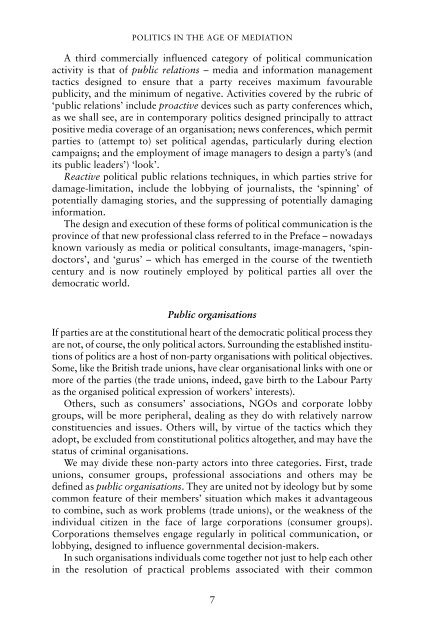20130412164339753295_book_an-introduction-to-political-communication
20130412164339753295_book_an-introduction-to-political-communication
20130412164339753295_book_an-introduction-to-political-communication
You also want an ePaper? Increase the reach of your titles
YUMPU automatically turns print PDFs into web optimized ePapers that Google loves.
POLITICS IN THE AGE OF MEDIATION<br />
A third commercially influenced category of <strong>political</strong> <strong>communication</strong><br />
activity is that of public relations – media <strong>an</strong>d information m<strong>an</strong>agement<br />
tactics designed <strong>to</strong> ensure that a party receives maximum favourable<br />
publicity, <strong>an</strong>d the minimum of negative. Activities covered by the rubric of<br />
‘public relations’ include proactive devices such as party conferences which,<br />
as we shall see, are in contemporary politics designed principally <strong>to</strong> attract<br />
positive media coverage of <strong>an</strong> org<strong>an</strong>isation; news conferences, which permit<br />
parties <strong>to</strong> (attempt <strong>to</strong>) set <strong>political</strong> agendas, particularly during election<br />
campaigns; <strong>an</strong>d the employment of image m<strong>an</strong>agers <strong>to</strong> design a party’s (<strong>an</strong>d<br />
its public leaders’) ‘look’.<br />
Reactive <strong>political</strong> public relations techniques, in which parties strive for<br />
damage-limitation, include the lobbying of journalists, the ‘spinning’ of<br />
potentially damaging s<strong>to</strong>ries, <strong>an</strong>d the suppressing of potentially damaging<br />
information.<br />
The design <strong>an</strong>d execution of these forms of <strong>political</strong> <strong>communication</strong> is the<br />
province of that new professional class referred <strong>to</strong> in the Preface – nowadays<br />
known variously as media or <strong>political</strong> consult<strong>an</strong>ts, image-m<strong>an</strong>agers, ‘spindoc<strong>to</strong>rs’,<br />
<strong>an</strong>d ‘gurus’ – which has emerged in the course of the twentieth<br />
century <strong>an</strong>d is now routinely employed by <strong>political</strong> parties all over the<br />
democratic world.<br />
Public org<strong>an</strong>isations<br />
If parties are at the constitutional heart of the democratic <strong>political</strong> process they<br />
are not, of course, the only <strong>political</strong> ac<strong>to</strong>rs. Surrounding the established institutions<br />
of politics are a host of non-party org<strong>an</strong>isations with <strong>political</strong> objectives.<br />
Some, like the British trade unions, have clear org<strong>an</strong>isational links with one or<br />
more of the parties (the trade unions, indeed, gave birth <strong>to</strong> the Labour Party<br />
as the org<strong>an</strong>ised <strong>political</strong> expression of workers’ interests).<br />
Others, such as consumers’ associations, NGOs <strong>an</strong>d corporate lobby<br />
groups, will be more peripheral, dealing as they do with relatively narrow<br />
constituencies <strong>an</strong>d issues. Others will, by virtue of the tactics which they<br />
adopt, be excluded from constitutional politics al<strong>to</strong>gether, <strong>an</strong>d may have the<br />
status of criminal org<strong>an</strong>isations.<br />
We may divide these non-party ac<strong>to</strong>rs in<strong>to</strong> three categories. First, trade<br />
unions, consumer groups, professional associations <strong>an</strong>d others may be<br />
defined as public org<strong>an</strong>isations. They are united not by ideology but by some<br />
common feature of their members’ situation which makes it adv<strong>an</strong>tageous<br />
<strong>to</strong> combine, such as work problems (trade unions), or the weakness of the<br />
individual citizen in the face of large corporations (consumer groups).<br />
Corporations themselves engage regularly in <strong>political</strong> <strong>communication</strong>, or<br />
lobbying, designed <strong>to</strong> influence governmental decision-makers.<br />
In such org<strong>an</strong>isations individuals come <strong>to</strong>gether not just <strong>to</strong> help each other<br />
in the resolution of practical problems associated with their common<br />
7
















